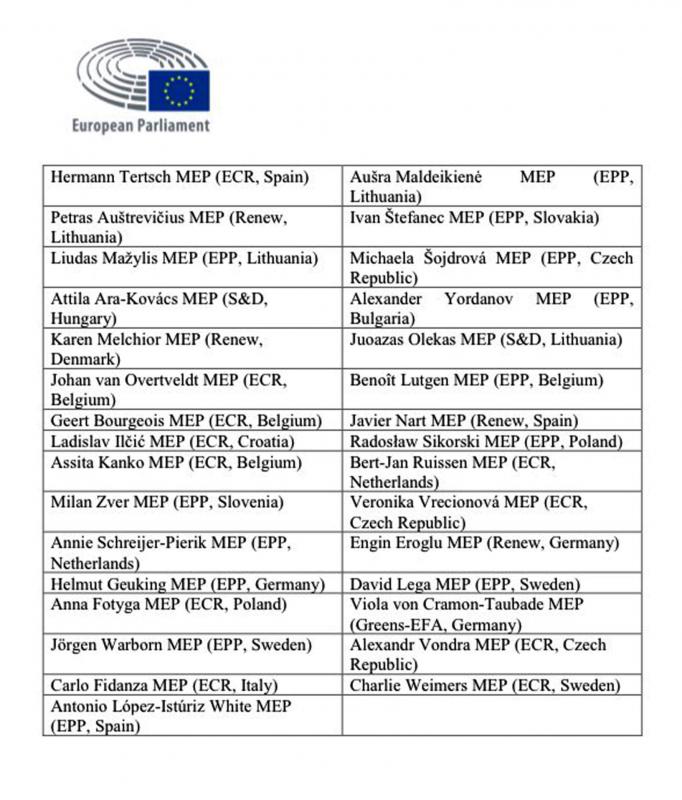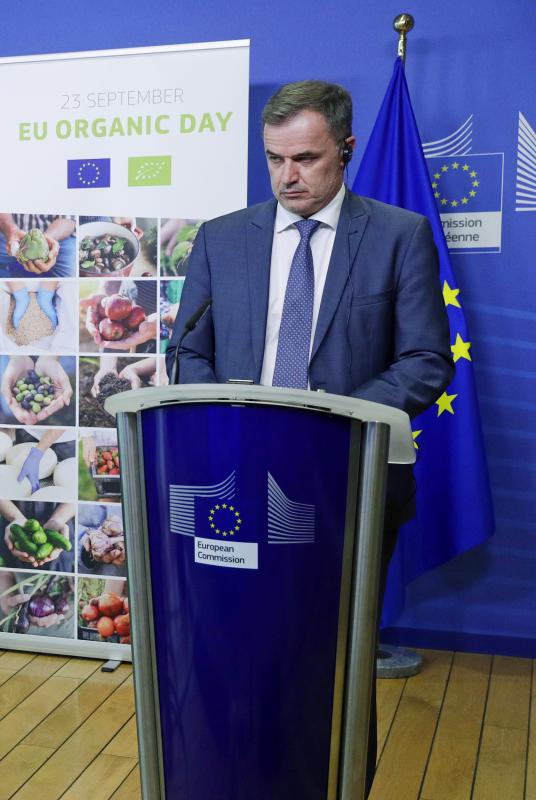A group of 41 EU lawmakers on Tuesday condemned China for its political and economic coercion of Lithuania, and called on leaders of the bloc to demonstrate solidarity with Vilnius.
The letter was initiated by Slovakian Member of the European Parliament (MEP) Miriam Lexmann, who is cochair of the Inter-Parliamentary Alliance on China.
“We, the undersigned members of the European Parliament, resolutely condemn political and economic coercion of the People’s Republic of China’s (PRC) against Lithuania,” the letter said.

Photo taken from Miriam Lexmann’s Twitter account
The letter addressed European Council President Charles Michel, European Commission President Ursula von der Leyen, High Representative of the EU for Foreign Affairs and Security Policy Josep Borrell and two other officials.
“The aggressive rhetoric of PRC officials, as well as the unexplained and undeclared measures which de facto constitute sanctions that ban Lithuanian-made products and those from other countries with Lithuanian components from entering the Chinese market are deplorable,” the letter said.
“Such unlegislated actions and practices violate not only all international and WTO rules of trade, but also directly impact underlying principles of the EU single market, and that is why they must be addressed by the European Union jointly,” it said.

Photo: EPA-EFE
“We refuse any form of pressure and condemn threats regarding the independent right of countries to develop relationships with Taiwan in line with their national interests and shared values of democracy and human rights without foreign interference,” the lawmakers wrote.
They said that “failing to respond to the PRC’s actions would embolden it to engage in further coercion against Lithuania or any other EU member states in the future.”
They welcomed joint statements of solidarity with Lithuania by US Secretary of State Antony Blinken and German Minister of Foreign Affairs Annalena Baerbock, while urging EU institutions to take stronger action.
“We urge EU institutions to follow suit and to take bold leadership in defending basic principles of the single market against the PRC intimidation. We cannot allow the PRC to undermine the EU’s basic values and principles,” the letter said.
The letter was also signed by German MEPs Reinhard Butikofer, Engin Eroglu and Helmut Geuking; Belgian MEPs Benoit Lutgen and Johan van Overtveldt; and other lawmakers.
In Taipei, the Ministry of Foreign Affairs thanked the European lawmakers for backing Taiwan-Lithuania relations.
The signatories were MEPs from 18 EU member states and five major caucuses, showing that countering pressure from China has become an international and cross-party consensus in Europe, the ministry said in a statement.
The ministry appeals to like-minded partners across the world to support Lithuania with concrete actions, which is to maintain supply-chain security, as well as a free and democratic market economy, it said.
Separately, Estonian Minister of Foreign Affairs Eva-Maria Liimets on Monday also voiced her country’s solidarity with Lithuania.
Estonian Public Broadcasting on Tuesday reported that Liimets made the comment during a teleconference with Chinese Minister of Foreign Affairs Wang Yi (王毅).
The virtual meeting was convened to discuss the UN Security Council — of which Estonia had been a non-permanent member until December last year — and cybersecurity and human rights, the broadcaster said.
Estonia stands with Lithuania in its recent dispute with Beijing and considers human rights a fundamental issue where no compromise can be made, Liimets was cited as saying.
Additional reporting by Jonathan Chin

CHAOS: Iranians took to the streets playing celebratory music after reports of Khamenei’s death on Saturday, while mourners also gathered in Tehran yesterday Iranian Supreme Leader Ayatollah Ali Khamenei was killed in a major attack on Iran launched by Israel and the US, throwing the future of the Islamic republic into doubt and raising the risk of regional instability. Iranian state television and the state-run IRNA news agency announced the 86-year-old’s death early yesterday. US President Donald Trump said it gave Iranians their “greatest chance” to “take back” their country. The announcements came after a joint US and Israeli aerial bombardment that targeted Iranian military and governmental sites. Trump said the “heavy and pinpoint bombing” would continue through the week or as long

TRUST: The KMT said it respected the US’ timing and considerations, and hoped it would continue to honor its commitments to helping Taiwan bolster its defenses and deterrence US President Donald Trump is delaying a multibillion-dollar arms sale to Taiwan to ensure his visit to Beijing is successful, a New York Times report said. The weapons sales package has stalled in the US Department of State, the report said, citing US officials it did not identify. The White House has told agencies not to push forward ahead of Trump’s meeting with Chinese President Xi Jinping (習近平), it said. The two last month held a phone call to discuss trade and geopolitical flashpoints ahead of the summit. Xi raised the Taiwan issue and urged the US to handle arms sales to

BIG SPENDERS: Foreign investors bought the most Taiwan equities since 2005, signaling confidence that an AI boom would continue to benefit chipmakers Taiwan Semiconductor Manufacturing Co’s (TSMC, 台積電) market capitalization swelled to US$2 trillion for the first time following a 4.25 percent rally in its American depositary receipts (ADR) overnight, putting the world’s biggest contract chipmaker sixth on the list of the world’s biggest companies by market capitalization, just behind Amazon.com Inc. The site CompaniesMarketcap.com ranked TSMC ahead of Saudi Aramco and Meta Platforms Inc. The Taiwanese company’s ADRs on Tuesday surged to US$385.75 on the New York Stock Exchange, as strong demand for artificial intelligence (AI) applications led to chip supply constraints and boost revenue growth to record-breaking levels. Each TSMC ADR represents

Pro-democracy media tycoon Jimmy Lai’s (黎智英) fraud conviction and prison sentence were yesterday overturned by a Hong Kong court, in a surprise legal decision that comes soon after Lai was jailed for 20 years on a separate national security charge. Judges Jeremy Poon (潘兆初), Anthea Pang (彭寶琴) and Derek Pang (彭偉昌) said in the judgement that they allowed the appeal from Lai, and another defendant in the case, to proceed, as a lower court judge had “erred.” “The Court of Appeal gave them leave to appeal against their conviction, allowed their appeals, quashed the convictions and set aside the sentences,” the judges